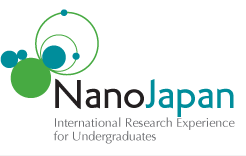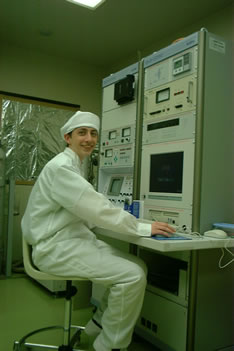


Alumni Update
Nathan has been awarded a 2009 National Science Foundation Graduate Research Fellowship to attend the Robotics Master's program at Carnegie Mellon University starting in the Fall of 2009. In addition to the NanoJapan program, he also participated in the Summer 2008 NASA Robotics Academy program at Marshall Space Flight Center and in 2008 was also acknowledged with an Honorable Mention from the Goldwater Scholarship.
NanoJapan Research Project Overview
My research project revolved around fabricating ballistic rectifiers from an InGaAs heterostructure. A rectifier is an electronic component which converts AC voltage to DC voltage and is an integral part of almost any electronic system. Ballistic rectifiers have two noticeable advantages over today's rectifiers: they are much smaller and can operate at much faster frequencies. In addition to smaller and faster devices, ballistic rectifiers could allow for manipulation of the terahertz frequency, which has several unique properties with a wide range of applications. To fabricate the devices I used a several chemical processes and over half a dozen machines, including e-beam and photolithography machines and e-beam and vacuum deposition machines. The Sasa Lab was very friendly and many group members spoke English well enough that my lack of proficiency in Japanese was rarely a problem, which was good since I couldn't take my dictionary into the clean room.
NanoJapan has had a very large impact on my future academic plans. At the beginning of the program I already had plans to go to graduate school but after having the chance to work in a graduate engineering laboratory among students pursuing MDs and PHDs, I discovered that a career in research is what interests me most. NanoJapan also introduced to me several other NSF sponsored programs, such as the NSF East Asian Pacific Summer Institute, that I plan on taking advantage of in the future.
Meaning of NanoJapan
I applied to NanoJapan because I wanted to learn more about nanotechnology, experience working in an international graduate laboratory and get a chance to study in Japan as a student. The opportunity to study abroad and do cutting edge research over the summer was a combination of goals I otherwise would not have been able to perform concurrently. Furthermore, I learned a lot about communicating in a foreign setting and with people not familiar with my culture or needs. I found that sharing a common interest and passion are much more important in a research setting than a common culture or native language. While nanotechnology is not the field I plan on continuing research in as a graduate student, NanoJapan still provided me with many experiences that will shape my academic career beyond undergraduate and graduate school.
I would like to return to Japan some day, and was excited to learn about a NSF program that funds international research projects over the summer for graduate students. I still maintain contact with a couple students in my laboratory and correspond in Japanese with a Chinese student that was in my language class. While Japanese language courses are not currently offered at my university, I talk with Japanese study abroad students and occasionally study Japanese during dinner.
Daily Life in Japan
A typical day during the research phase of the program began, unsurprisingly, with me waking up, usually to a Japanese cartoon show. I stayed in a dorm style building owned by Osaka Institute of Technology that housed traveling businessmen and professors, and, on one occasion, what appeared to be an elementary school soccer team. The building was just completed and the rooms had individual bathrooms. There was also a washer and dryer, as well as a microwave I discovered one week before leaving, but internet service had not yet been installed. After a short walk, I arrived at the lab around 9am, and was usually in my bunny suit in the clean room by 9:30 unless I had data to process or a paper to work on. I worked alongside a student in his second of three years of work towards a PHd in Electrical Engineering. Whenever I had a question he would nearly drop what he was doing to answer my question, and when he was in the middle of something un-interruptible, assigned a masters student to help me; the hierarchical nature of the lab was very noticeable given the limited amount of equipment. I performed research until noon or so, when we would, in the first weeks, go to a nearby restaurant or the cafeteria and eat a somewhat leisurely lunch. As time progressed and they realized I was eager to do research, they went back to their normal routine of going to the nearest convenience store (practically across the street), grabbing food and eating it quickly in the lab's computer room before returning to work. I was amazed by the dedication shared by all members of the lab – even during lunch many were eager to learn about progress of other research in the lab or in the field. After lunch it was back to the clean room, where work continued well into the evening. The only exception to this was Monday and Wednesday, when there were lab presentations for an hour or two. Two days a week I had language class I went to as well, which sometimes conflicted with time sensitive research processes or measurements; but luckily, my mentor took care of them while I was in language class. I usually left sometime between 7pm and 10pm, although I was almost always done with my research by 7pm. Even though I left late, I rarely ate dinner with labmates as most did not eat dinner until they got home in the late evening. As most shops were closing around the time I finished at the lab, the majority of my sightseeing happened on the weekends.
My most memorable lab experience was when I was taking the initial measurements of a sample I had just finished fabricating. My mentor was skilled enough that he could interpret the raw data and became increasingly excited as more voltage measurements were taken. Whenever someone walked near the device, he would say “Mite mite!” (look, look!) and start talking about how good the data was. It was my first device and it was very rewarding to see I had fabricated the device properly and knew enough Japanese to have an idea of what he was saying to the other lab students.
My favorite experience in Japan was...
It is impossible to label a single experience as my favorite. climbing Mount Fuji, viewing the night view of Osaka and fireworks (summer is fireworks season after all) and going to the beach and a Hanshin Tigers game with new friends were all highlights of my summer. As many previous participants have already written (so I will talk about something else), climbing Mount Fuji is an amazing experience that you should participate in if you have the chance. Not only is the sunrise amazing, but the view of the base stations and night sky as you ascend is unimaginable. One of my favorite experiences with my Japanese friends was when I got to stay overnight at a labmate's home (Japanese university/graduate students almost always live with their parents) before an early morning roadtrip to Shirahama Beach, where I got to swim in the ocean for my first time (it is really, really salty). We left in the afternoon to see the night view of Osaka from the west. On our way to the viewing hill we stopped at a famous restaurant, where I accidentally ordered some very spicy Korean ramen, a memorable experience indeed! The night view of any major city in Japan is breathtaking, make sure you know how to adjust your camera settings or get a new camera at Yodobashi! My advice would be to plan typical tourist trips to places like Mount Fuji ahead of time and get advice from labmates on interesting local places and events to go to. The Japanese are very kind to tourists and will go out of their way to make sure you leave with lots of great memories!
Before I left for Japan I wish I had...
Before leaving for Japan I wish I had spent more time figuring out exactly how much and what kind of clothing I would need. I could have survived with less “daily” clothes and would have been better off on Mt Fuji with an actual jacket. While in Japan, I wish I hadn't put off buying most of my souvenirs until the last week. I regret not buying more of the cell phone trinkets which are so common and popular in Japan; everyone that sees mine now wants one! They would have made great gifts for my friends and family back home.